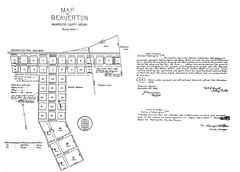 You can find old houses that were once beautiful throughout poorer sections of Salem, nearly always abutting high speed roads that have destroyed the homes along the streets that ferry the well-to-do to their neighborhoods across town. Image by McMorr via Flickr
You can find old houses that were once beautiful throughout poorer sections of Salem, nearly always abutting high speed roads that have destroyed the homes along the streets that ferry the well-to-do to their neighborhoods across town. Image by McMorr via Flickr
Most of what city officials do these days in the name of "planning" consists of figuring out ways to cater to the automobiles of people in well-off neighborhoods at the expense of people in less-well-off neighborhoods, imposing "mobility standards" that essentially offer up the neighborhoods of the poor and minority areas as high-speed sacrifice zones for the richer people to drive through (with monstrous "improvements" naturally slated for these areas, where the people are too poor to fight back).
Look at any decrepit section of a residential area where there are once-beautiful homes oddly close to the roads -- you will find that these were once grand homes but, when the road got wider, they became rentals and then meth dens and now sit as reproachful monuments to our "Auto Uber Alles" idea of city planning.
Shameful. And stupid.
UPDATE: Hat tip to RR for this:
"UGB expansions involve big stakes. Expansions can cost taxpayers hundreds of millions in new infrastructure and services, reduce quality of life, damage natural areas and increase global warming. But developers and land speculators can cash in on a sometimes 10-fold increase in land values." --- John Platt, Helvetia Winery
From Planning for Sprawl: Staff study betrays bias for unbridled development, by Alan Pittman Eugene Weekly.


![Reblog this post [with Zemanta]](http://img.zemanta.com/reblog_e.png?x-id=a31a2a0b-e3b4-44da-8807-129cb74f819e)

![Reblog this post [with Zemanta]](http://img.zemanta.com/reblog_e.png?x-id=3c5cdfc0-f490-4ef1-a78d-0f7c2b2126db)



